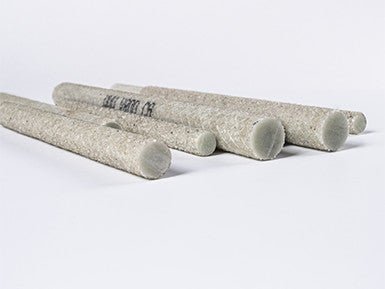Rebar (short for "reinforcing bar") is a steel bar or mesh of steel wires used as a tension device in reinforced concrete and reinforced masonry structures.
Bulk orders/pricing and partial bundles are both possible. 20' lengths are standard but longer lengths can be customized
Features and Benefits
-
V-Rod is 2-1/2 times stronger than Grad 60 steel
-
V-Rod in most cases because of the tensile strength can be can be reduced, example if the job calls for #5 steel rebar, we can reduce to #4 GFRP
-
V-Rod offers engineering at no extra cost (Convert your steel job to GFRP)
-
V-Rod in most cases your able to reduce your concrete coverage by 10% (the extra coverage is only to protect the steel)
-
V-Rod is 35% fast to install because it weighs a fraction of steel.
-
V-Rod is products is manufactured with Fiberglass and Resin, it is not a volatile in the market like steel pricing
-
V-Rod offers a 150 year life on our products or more
-
V-Rod if you take out the steel you can also use seawater in the concrete mix. (Fresh water not needed)
- V-Rod one truckload of V-Rod equals 6 trucks of steel (save money on transportation)
| Products | # of bars per TL | Lbs / 20' bar | Bundle Size |
| #2 Poly 46 | 38,000 | 1.128 | 1000 |
| #3 Poly 46 | 20,160 | 2.197 | 1008 |
| #4 Poly 46 | 12,000 | 3.717 | 600 |
| #5 Poly 46 | 7,700 | 5.739 | 550 |
WHEN SAFETY AND SAVINGS GET ALONG
The use of V•ROD fiberglass rebar provides significant savings while increasing users’ safety.
- Savings on life cycle cost
- Construction savings
- Increased safety for owners and users
- Green product
- Corrosion resistance
- Thermal insulation and lightness
- Thermal expansion compatible with concrete
- Electrical and magnetic neutrality
- Superior tensile strength
- Simplified management on site
A FUTURE-ORIENTED SOLUTION YOU CAN TRUST
V-ROD is the reinforcing solution of the future. Trust in this sustainable rebar is shown by its qualification and presence in the main construction codes, as well as its adoption in the standards of authorities of many Canadian provinces, American states, and metropolitan cities around the world.
Rebar provides added strength and stability to concrete structures and is commonly used in construction projects such as buildings, bridges, and highways.
Poly rebar, on the other hand, is a type of rebar that is made from a composite material consisting of a polymer matrix reinforced with fiberglass or carbon fiber. It is lighter than traditional steel rebar and is corrosion-resistant, making it an ideal choice for construction projects in harsh environments.
Poly rebar is also non-magnetic, which makes it suitable for use in areas where magnetic fields could interfere with sensitive equipment, such as medical facilities and computer server rooms. Additionally, it is non-conductive, which means it can be used in structures that require electrical insulation.
Overall, both traditional steel rebar and poly rebar serve the same purpose of reinforcing concrete structures, but poly rebar offers some unique advantages due to its composite material construction.







